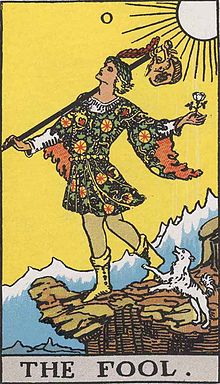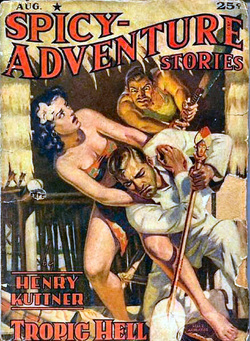
The young man, intent on the lofty heights of his own potential, steps off a cliff and plunges into darkness...
So begins the story of the Tarot and of the archetypal Hero's Journey. If you've read Christopher Vogler's The Writer's Journey, or the work of Joseph Campbell (on which it's based), you're probably familiar with the formula:
First, we meet our hero in the Ordinary World. She receives a Call to Adventure, which she initially Refuses. Fate and/or her Mentor help change her mind and so she strides boldly into the darkness, where she must suffer many hardships and perils and ultimately make some Supreme Sacrifice before she can emerge with an Elixir.
Raise your hand if you've heard this one before... (The Wizard of Oz, Star Wars, every big budget Hollywood movie produced in the last couple of decades, etc.)
Now, here's my question: why is this such a powerful story? Why do we listen so eagerly and identify so readily with such a simple and endlessly repeated formula? Could it be that we recognize the pattern of it as the essential process of personal growth? What if we considered the Hero's Journey as our own necessary journey and took our cues appropriately?
You might think this is just a writerly bit of nonsense. Seriously, who's calling anyone to adventure, any more? Surely the last great adventures died out when all the frontiers went away. Life now is just about work and relationships and paying bills, right?

Think of some bit of critique or feedback you've received on your writing in the last few weeks or months--specifically one that made you either say: "Ugh, that #$%@ imbecile had no idea what s/he was talking about," or "Yeah, yeah, I know that would make my work better, but I just can't commit the time or energy to do it right now." Any time you experience an exceedingly negative response to a piece of feedback, or respond with a "Yeah, but..." I would argue you've just received a potent Call to Adventure and Refused it. Steps One and Two on the Hero's Journey: check!
The trouble is, most of us stop there. We neither trust fate nor a mentor enough to help us make the crucial decision to enter the darkness. Or perhaps we do plunge into a darkness of self-doubt and despair, but then fail to make the Supreme Sacrifice necessary to recover an Elixir.

What can we sacrifice without giving up our true self?
How do we know what to change and what to preserve? After all, isn't it entirely possible that the person giving us feedback was in fact wrong? Or, even if the person might have been right, couldn't it be true that they're just right for other people?
Don't all the great authors out there succeed by sticking to their guns and believing in their own work even when others don't?
If I just write some book other people want to read, won't I be giving up the whole point of me becoming a writer in the first place--the opportunity to tell my unique and singular story?
These are all key questions to ask when you're in the darkness. Indeed, I think it's only from asking these questions that we can find our way to the Elixir. The trick is minding our own internal antagonists along the way. Just as antagonists typically drive the early part of the action and propel a hero toward her destiny in fiction, so too can our own demons lead us toward the crucial moment when everything is on the line.
Pay attention to where your own resistance is most intense. Where do you feel most tender? Most vulnerable? Most angry? Most frightened? What part of you are you desperately and even irrationally trying to protect, despite the fact that you keep receiving feedback that it's a weakness? Do you keep saying "Yeah, but..." or "You're an idiot!" when people approach this very sensitive spot? If so, that's likely the place you need to go if you want to find the Elixir.
It may seem impossible or profoundly unpleasant, but I'm guessing the impossible-er or unpleasant-er it feels, the more important it is to push at that precise spot. You may feel brutally and wretchedly exposed or humiliated, or it may seem like all the work you've done for so long is suddenly worthless. You may feel alone, abandoned, sold out. Certainly this is the point we try to take our heroes to on their journeys. So why not follow them there ourselves?
Just as it's true for our Heroes, at a certain point, it will all be up to you. You will be given the opportunity to learn the lesson, to sacrifice the precious thing you've been clutching, to face the most frightening enemy you can imagine and give everything you have to the encounter.
Muster your courage, gather your conviction, and then let go.
And don't forget to grab the elixir on your way out.
[P.S. - Once you've returned (or to those who've already gone through that darkness), tell us in the comments what you found.]
 RSS Feed
RSS Feed